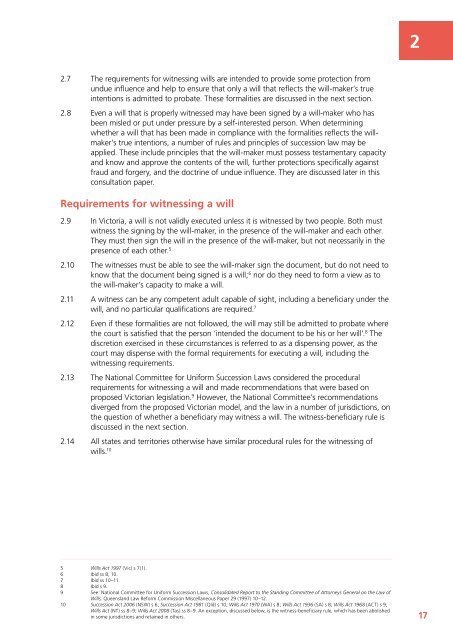Succession Laws - Victorian Law Reform Commission
Succession Laws - Victorian Law Reform Commission
Succession Laws - Victorian Law Reform Commission
You also want an ePaper? Increase the reach of your titles
YUMPU automatically turns print PDFs into web optimized ePapers that Google loves.
22.7 The requirements for witnessing wills are intended to provide some protection fromundue influence and help to ensure that only a will that reflects the will-maker’s trueintentions is admitted to probate. These formalities are discussed in the next section.2.8 Even a will that is properly witnessed may have been signed by a will-maker who hasbeen misled or put under pressure by a self-interested person. When determiningwhether a will that has been made in compliance with the formalities reflects the willmaker’strue intentions, a number of rules and principles of succession law may beapplied. These include principles that the will-maker must possess testamentary capacityand know and approve the contents of the will, further protections specifically againstfraud and forgery, and the doctrine of undue influence. They are discussed later in thisconsultation paper.Requirements for witnessing a will2.9 In Victoria, a will is not validly executed unless it is witnessed by two people. Both mustwitness the signing by the will-maker, in the presence of the will-maker and each other.They must then sign the will in the presence of the will-maker, but not necessarily in thepresence of each other. 52.10 The witnesses must be able to see the will-maker sign the document, but do not need toknow that the document being signed is a will; 6 nor do they need to form a view as tothe will-maker’s capacity to make a will.2.11 A witness can be any competent adult capable of sight, including a beneficiary under thewill, and no particular qualifications are required. 72.12 Even if these formalities are not followed, the will may still be admitted to probate wherethe court is satisfied that the person ‘intended the document to be his or her will’. 8 Thediscretion exercised in these circumstances is referred to as a dispensing power, as thecourt may dispense with the formal requirements for executing a will, including thewitnessing requirements.2.13 The National Committee for Uniform <strong>Succession</strong> <strong><strong>Law</strong>s</strong> considered the proceduralrequirements for witnessing a will and made recommendations that were based onproposed <strong>Victorian</strong> legislation. 9 However, the National Committee’s recommendationsdiverged from the proposed <strong>Victorian</strong> model, and the law in a number of jurisdictions, onthe question of whether a beneficiary may witness a will. The witness-beneficiary rule isdiscussed in the next section.2.14 All states and territories otherwise have similar procedural rules for the witnessing ofwills. 105 Wills Act 1997 (Vic) s 7(1).6 Ibid ss 8, 10.7 Ibid ss 10–11.8 Ibid s 9.9 See: National Committee for Uniform <strong>Succession</strong> <strong><strong>Law</strong>s</strong>, Consolidated Report to the Standing Committee of Attorneys General on the <strong>Law</strong> ofWills, Queensland <strong>Law</strong> <strong>Reform</strong> <strong>Commission</strong> Miscellaneous Paper 29 (1997) 10–12.10 <strong>Succession</strong> Act 2006 (NSW) s 6; <strong>Succession</strong> Act 1981 (Qld) s 10; Wills Act 1970 (WA) s 8; Wills Act 1936 (SA) s 8; Wills Act 1968 (ACT) s 9;Wills Act (NT) ss 8–9; Wills Act 2008 (Tas) ss 8–9. An exception, discussed below, is the witness-beneficiary rule, which has been abolishedin some jurisdictions and retained in others.17
















